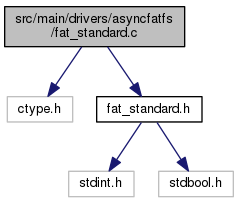|
NinjaFlight
|
|
NinjaFlight
|

Functions | |
| bool | fat16_isEndOfChainMarker (uint16_t clusterNumber) |
| bool | fat32_isEndOfChainMarker (uint32_t clusterNumber) |
| uint32_t | fat32_decodeClusterNumber (uint32_t clusterNumber) |
| bool | fat_isFreeSpace (uint32_t clusterNumber) |
| bool | fat_isDirectoryEntryTerminator (fatDirectoryEntry_t *entry) |
| bool | fat_isDirectoryEntryEmpty (fatDirectoryEntry_t *entry) |
| void | fat_convertFilenameToFATStyle (const char *filename, uint8_t *fatFilename) |
| bool fat16_isEndOfChainMarker | ( | uint16_t | clusterNumber | ) |
| uint32_t fat32_decodeClusterNumber | ( | uint32_t | clusterNumber | ) |
FAT32 cluster numbers are really only 28 bits, and the top 4 bits must be left alone and not treated as part of the cluster number (so various FAT drivers can use those bits for their own purposes, or they can be used in later extensions)
| bool fat32_isEndOfChainMarker | ( | uint32_t | clusterNumber | ) |
| void fat_convertFilenameToFATStyle | ( | const char * | filename, |
| uint8_t * | fatFilename | ||
| ) |
Convert the given "prefix.ext" style filename to the FAT format to be stored on disk.
fatFilename must point to a buffer which is FAT_FILENAME_LENGTH bytes long. The buffer is not null-terminated.
| bool fat_isDirectoryEntryEmpty | ( | fatDirectoryEntry_t * | entry | ) |
| bool fat_isDirectoryEntryTerminator | ( | fatDirectoryEntry_t * | entry | ) |
| bool fat_isFreeSpace | ( | uint32_t | clusterNumber | ) |